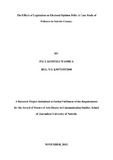| dc.description.abstract | Public opinion polls are critical in shaping and transforming the society. Properly conducted and disseminated, polls give the general public an opportunity for its voice to be heard and influence the social – political and economic processes in the country. The regulation of electoral opinion polls aims at protecting the integrity and fairness of electoral process and safeguarding citizens against accesses of information that might confuse them or interfere with their freedom of choice. However, such legislations can also be seen as efforts by the ruling class to suppress the citizen’s freedom of expression and access to information.
This study was carried out to investigate the effects of legislation on electoral opinion polls. A case study of pollsters in Nairobi County. It was guided by the following objectives: - (i) to investigate the factors that influence electoral opinion polling in Kenya, (ii) to find out the factors that influence people’s voting patterns in Kenya, (iii) to determine the extent to which legislation influences voter’s access to credible, reliable and representative polls and (iv) to investigate the role of communication in creating awareness about electoral opinion polls.
The study adopted descriptive survey design. Sample size was achieved through purposive and systematic random sampling techniques. Informant interviews and self – administered questionnaires were used as the data collection tools. Quantitative data was analyzed using Statistical Package for Social Sciences (SPSS version 20). Qualitative data was presented thematically.
This study established that legislation on electoral opinion polls influences electoral opinion polling in Kenya to some extent. The major findings of the study indicated that political parties influence electoral opinion polls in Kenya, the party’s / individuals manifesto formed the people’s voting patterns in Kenya, the legislation influences voter’s access to credible, reliable
and representative polls and communication plays a very significant role in electoral opinion polls.
The researcher recommends that the current legislation on electoral opinion polls should be evaluated to ensure its objectivity and that citizen’s rights to access information is not compromised by law. At the same time, the relevant bodies should educate the public on the role and importance of polls. | en |

